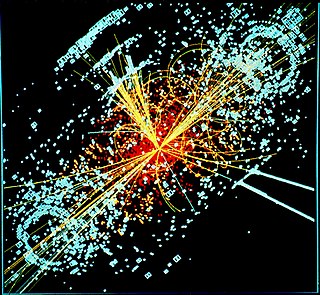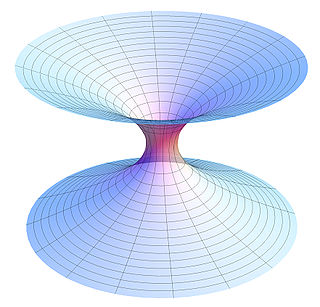The following outline is provided as an overview of and topical guide to physics:
Quantum gravity (QG) is a field of theoretical physics that seeks to describe gravity according to the principles of quantum mechanics. It deals with environments in which neither gravitational nor quantum effects can be ignored, such as in the vicinity of black holes or similar compact astrophysical objects, such as neutron stars as well as in the early stages of the universe moments after the Big Bang.

In philosophy, philosophy of physics deals with conceptual and interpretational issues in modern physics, many of which overlap with research done by certain kinds of theoretical physicists. Philosophy of physics can be broadly divided into three areas:

Loop quantum gravity (LQG) is a theory of quantum gravity, which aims to reconcile quantum mechanics and general relativity, incorporating matter of the Standard Model into the framework established for the intrinsic quantum gravity case. It is an attempt to develop a quantum theory of gravity based directly on Einstein's geometric formulation rather than the treatment of gravity as a mysterious mechanism (force). As a theory LQG postulates that the structure of space and time is composed of finite loops woven into an extremely fine fabric or network. These networks of loops are called spin networks. The evolution of a spin network, or spin foam, has a scale above the order of a Planck length, approximately 10−35 meters, and smaller scales are meaningless. Consequently, not just matter, but space itself, prefers an atomic structure. The areas of research, which involve about 30 research groups worldwide, share the basic physical assumptions and the mathematical description of quantum space. Research has evolved in two directions: the more traditional canonical loop quantum gravity, and the newer covariant loop quantum gravity, called spin foam theory. The most well-developed theory that has been advanced as a direct result of loop quantum gravity is called loop quantum cosmology (LQC). LQC advances the study of the early universe, incorporating the concept of the Big Bang into the broader theory of the Big Bounce, which envisions the Big Bang as the beginning of a period of expansion that follows a period of contraction, which one could talk of as the Big Crunch.

In physics, black hole thermodynamics is the area of study that seeks to reconcile the laws of thermodynamics with the existence of black hole event horizons. As the study of the statistical mechanics of black-body radiation led to the development of the theory of quantum mechanics, the effort to understand the statistical mechanics of black holes has had a deep impact upon the understanding of quantum gravity, leading to the formulation of the holographic principle.

Carlo Rovelli is an Italian theoretical physicist and writer who has worked in Italy, the United States and, since 2000, in France. He is also currently a Distinguished Visiting Research Chair at the Perimeter Institute, and core member of the Rotman Institute of Philosophy of Western University. He works mainly in the field of quantum gravity and is a founder of loop quantum gravity theory. He has also worked in the history and philosophy of science. He collaborates with several Italian newspapers, including the cultural supplements of the Corriere della Sera, Il Sole 24 Ore and La Repubblica. His popular science book, Seven Brief Lessons on Physics, was originally published in Italian in 2014. It has been translated into 41 languages and has sold over a million copies worldwide. In 2019, he was included by Foreign Policy magazine in a list of 100 most influential global thinkers.
The history of loop quantum gravity spans more than three decades of intense research.
In general relativity, the hole argument is an apparent paradox that much troubled Albert Einstein while developing his famous field equations.

Liliana Cavani is an Italian film director and screenwriter. She belongs to a generation of Italian filmmakers from Emilia-Romagna that came into prominence in the 1970s, including Bernardo Bertolucci, Pier Paolo Pasolini and Marco Bellocchio. Cavani became internationally known after the success of her 1974 feature film Il portiere di notte. Her films have historical concerns. In addition to feature films and documentaries, she has also directed opera.
Foundations of Physics is a monthly journal "devoted to the conceptual bases and fundamental theories of modern physics and cosmology, emphasizing the logical, methodological, and philosophical premises of modern physical theories and procedures". The journal publishes results and observations based on fundamental questions from all fields of physics, including: quantum mechanics, quantum field theory, special relativity, general relativity, string theory, M-theory, cosmology, thermodynamics, statistical physics, and quantum gravity

Theoretical physics is a branch of physics that employs mathematical models and abstractions of physical objects and systems to rationalize, explain and predict natural phenomena. This is in contrast to experimental physics, which uses experimental tools to probe these phenomena.
In general relativity, the Ehrenfest–Tolman effect, created by Richard C. Tolman and Paul Ehrenfest, argues that temperature is not constant in space at thermal equilibrium, but varies with the spacetime curvature. Specifically, it depends on the spacetime metric. In a stationary spacetime with timelike Killing vector field , the temperature satisfies instead the Tolman-Ehrenfest relation: , where is the norm of the timelike Killing vector field.
The thermal time hypothesis is a possible solution to the problem of time in classical and quantum theory as has been put forward by Carlo Rovelli and Alain Connes. Physical time flow is modeled as a fundamental property of the theory, a macroscopic feature of thermodynamical origin.
In loop quantum gravity theory, a Planck star is a hypothetical astronomical object, theorized as a compact, exotic star, that exists within a black hole's event horizon, created when the energy density of a collapsing star reaches the Planck energy density. Under these conditions, assuming gravity and spacetime are quantized, a repulsive "force" arises from Heisenberg's uncertainty principle. The accumulation of mass–energy inside the Planck star cannot collapse beyond this limit because it violates the uncertainty principle for spacetime itself.
In theoretical physics, the problem of time is a conceptual conflict between general relativity and quantum mechanics in that quantum mechanics regards the flow of time as universal and absolute, whereas general relativity regards the flow of time as malleable and relative. This problem raises the question of what time really is in a physical sense and whether it is truly a real, distinct phenomenon. It also involves the related question of why time seems to flow in a single direction, despite the fact that no known physical laws at the microscopic level seem to require a single direction. For macroscopic systems the directionality of time is directly linked to first principles such as the second law of thermodynamics.

Seven Brief Lessons on Physics is a short book by the Italian physicist Carlo Rovelli. Originally published in Italian in 2014, by 2021 the book has been translated into 52 languages. More than a million copies have been sold, of which more than 400,000 in Italy.
The Order of Time may refer to:

Reality Is Not What It Seems: The Journey to Quantum Gravity is an illustrated book by Italian physicist Carlo Rovelli. The book discusses quantum gravity. It was first published in Italian in 2014. It was published in English in 2016 by which time the English translation of Seven Brief Lessons had already appeared.
Francesca Vidotto is an Italian theoretical physicist.

The Order of Time is a 2023 Belgian-Italian film directed by Liliana Cavani, from a screenplay written by Cavani and Paolo Costella in collaboration with physicist Carlo Rovelli. The film is freely inspired by Rovelli's 2017 essay of the same name. It stars an ensemble cast, which includes Alessandro Gassmann, Claudia Gerini, Edoardo Leo, Kseniya Rappoport, Richard Sammel, Valentina Cervi, Fabrizio Rongione, Francesca Inaudi and Ángela Molina.









